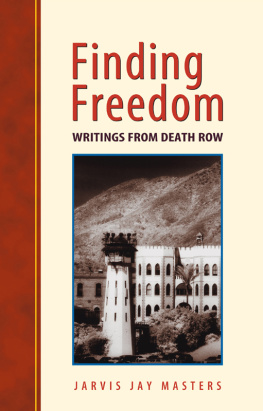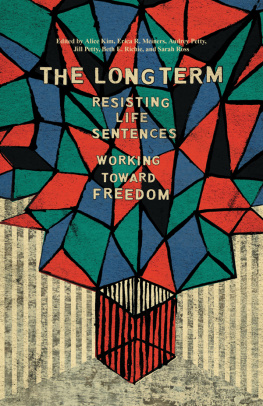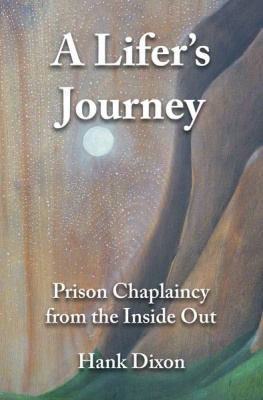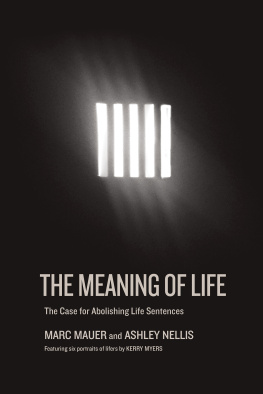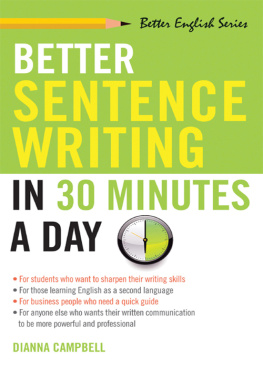University of California Press, one of the most distinguished university presses in the United States, enriches lives around the world by advancing scholarship in the humanities, social sciences, and natural sciences. Its activities are supported by the UC Press Foundation and by philanthropic contributions from individuals and institutions. For more information, visit www.ucpress.edu.
University of California Press
Oakland, California
2019 by Steve Herbert
Library of Congress Cataloging-in-Publication Data
Names: Herbert, Steven Kelly, 1959 author.
Title: Too easy to keep : life-sentenced prisoners and the future of mass incarceration / Steve Herbert.
Description: Oakland, California : University of California Press, [2019] | Includes bibliographical references and index. |
Identifiers: LCCN 2018023684 (print) | LCCN 2018025473 (ebook) | ISBN 9780520971875 (e-book) | ISBN 9780520300507 (cloth : alk. paper) | ISBN 9780520300514 (pbk. : alk. paper)
Subjects: LCSH : PrisonersSocial aspectsUnited States.
Classification: LCC HV 9469 (ebook) | LCC HV 9469 . H 47 2018 (print) | DDC 365/.60973dc23
LC record available at https://lccn.loc.gov/2018023684
Manufactured in the United States of America
27 26 25 24 23 22 21 20 19
10 9 8 7 6 5 4 3 2 1
Preface and Acknowledgments
My first extensive interactions with incarcerated men occurred in 2013, in a small fluorescent-lit classroom in the Washington State Reformatory. I was there to meet with the prisoner advisory council for a nonprofit organization, University Beyond Bars, which provides college-preparatory and college-level instruction for those incarcerated at the reformatory.
I was planning a mixed enrollment course, one that would include roughly equal numbers of students from University Beyond Bars and from the Department of Law, Societies, and Justice at the University of Washington. The course would be taught entirely inside the reformatory. I was at the prison to discuss both the class and a miniseminar that I planned to offer first so I could become familiar with teaching inside.
It was a pleasant conversation. Each man from the prisoner advisory council greeted me warmly with a firm handshake as he entered the room. I was offered a cup of pomegranate tea. Although one prisoners questions betrayed some suspicion about my motivations, there was a pervasive enthusiasm about my plans. I left the meeting feeling optimistic.
That feeling only intensified throughout the course of the miniseminar. For four class sessions, the participants engaged in thoughtful and probing conversations about some recent and controversial U.S. Supreme Court rulings. These were classes like thousands of others I have taught over my career. They were special only because of the location.
Much the same could be said about the subsequent mixed-enrollment course. Despite some initial awkwardness, the class quickly fell into a nice rhythm. Small group discussions demonstrated significant energy, and large group debates birthed telling insights and creative analysis. It was as good a classroom dynamic as any I had ever seen.
I must admit that I was surprised by this outcome. As I write this now, some years later, my surprise shames me.
My surprise was born out of ignorance, out of my own implicit stereotypes of prisoners. Despite my understanding of the dynamics behind mass incarceration, I was still taken aback that so many prisoners possessed the engaged intellects they so readily displayed. I should have known better; I should have known that our prisons house many, many thoughtful and capable people.
I was also surprised to learn that many of those stellar University Beyond Bars students were serving extremely long sentences, up to and including life without the possibility of parole. This reality shamed me even more. I was more than a little troubled that the state in which I livedand for which I workedwould condemn perfectly mature and valuable individuals to life behind bars with no hope of release.
My surprise and shame motivated this book. I seek here to shed light on a reality about which most U.S. citizens are unaware. It is a little-known fact that life-sentenced prisoners are a large and growing component of Americas incarcerated population. Despite increased awareness that the United States leads the world in its rate of incarceration, less attention falls on the rise of life sentences. This neglect is troublesome. Unless the trend is reversed, thousands of individuals who deserve release will be condemned to die in prison. This morally questionable outcome is compounded further by cost considerations. Aging prisoners, unsurprisingly, are expensive to house. As these prisoners pile up inside Americas institutions, states like Washington will face staggering price tags.
Such moral and fiscal challenges should be addressed directly and transparently in considered public conversations. My hope is that this book can help stimulate such conversations by documenting many of the consequences of the increase in life sentences.
While researching and writing this volume, I incurred many debts. I cannot hope to repay those debts, but I must at least acknowledge them.
I first thank the Washington Department of Corrections for granting me the necessary access to acquire the interview data upon which my analysis principally rests. Staff at the Monroe Correctional Complex worked assiduously to schedule the extensive number of interviews, and many of them sat for interviews themselves. Their assistance with this project was invaluable.
The good people at University Beyond Bars enabled my first efforts at prison education. I especially thank Stacey Reeh, who was unfailingly responsive, considerate, and bureaucratically adept. Without her, the mixed-enrollment effort would never have launched, and this book would never have resulted.
That the mixed-enrollment courses continue is due significantly to Tim and Connie Wettack. Their generosity and their example are inspirations. Tim and Connie also provided my introduction to the Concerned Lifers Organization, whose efforts at prison reform energize me and countless others.
At the University of Washington, I am blessed to be part of the supportive community that is the Department of Law, Societies, and Justice. There are too many members of that community to individually thank here, but the faculty, students, and staff all motivate me each and every day. Their collective enthusiasm for prison-based education, and for thoughtful attention to punishment policy, has done much to keep me going. It is simply an honor to work alongside them.
For her support of the Department of Law, Societies, and Justice and of our efforts to institutionalize prison-based education, I thank Judy Howard. Her enthusiasm was unwavering and consequential.
I received much-appreciated financial support from the Royalty Research Fund at the University of Washington. Much of this book was conceived, written, and edited at the Whiteley Center. I thank the staff there, and especially Kathy Cowell, for making it such a welcoming and contemplative place.


